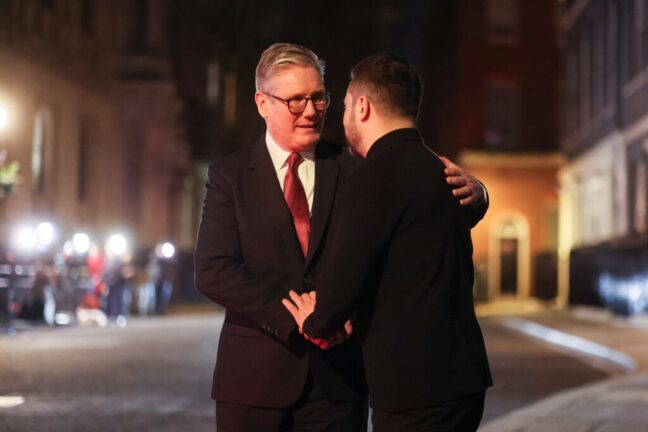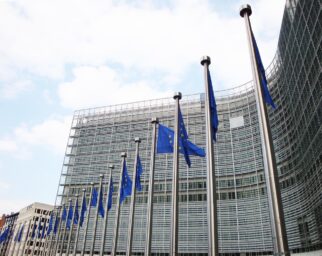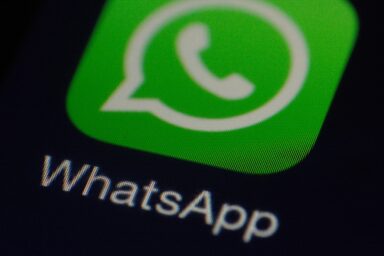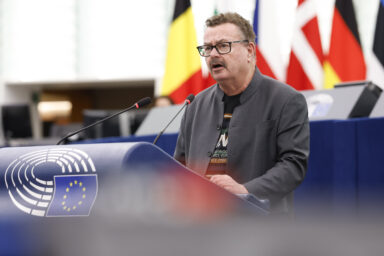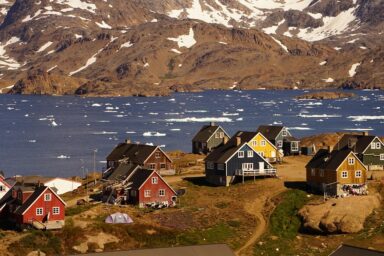The turn of February-March 2025 will go down in history as a period of global political tumult. China has fundamentally hardened its threats against Taiwan, Donald Trump and Elon Musk have dived into dismantling the American system of government, Europe’s largest democracy threw out its government, and the UK has emerged as an improbable leader in the creation of a new European defence architecture. The European Union, by contrast, has been sidelined.
The joint session of the European Parliament’s Committees on Foreign Affairs and Budgets should not have been an acrimonious affair. It dealt with the Reform and Growth Facility for Moldova, a measure aimed to support the country during the period from 2025 to 2027, expected to provide up to €285m in grants and €1.5bn in loans.
The vote on the matter was a resolute aye but the atmosphere was tense. Angéline Furet MEP (PfE/FR) asked indignantly why the EU should “waste taxpayers‘ money to support third countries” like Moldova while its own citizens were struggling. “The EU is not here to finance random reforms,“ the National Rally politician said.
The usually affable AFET Chair David MacAllister, who presided over the meeting, was not amused. “Last week, five members of our committee travelled to Moldova, and there has been tremendous concern about the US ending the USAID.“ Then he said icily, turning to Ms Furet: “As to our dear colleague of the Patriots of Europe faction, maybe a trip to Moldova might enlighten you…“ He was cut off by the MEPs‘ applause.
You might be interested
The following regular meeting of AFET was conducted in a similar spirit. It dealt primarily with whether Montenegro was doing enough to clear the hurdles separating it from EU membership. The country had set an ambitious goal – to become a full 28th member of the Union by 2028.
Most of those MEPs who took the floor agreed that Montenegro was doing great, and hailed the fact that the Balkans country had already concluded six out of thirty-three accession chapters. As an aside, it was also mentioned that it would help if the country were less corrupt, were more politically stable, and not a hotbed of organised crime.
Perhaps somewhat oddly for the uninitiated, the Committee did not address what many regard as a matter superseding in the urgency department the ups and downs of Montenegro accession efforts, namely the diplomatic humiliation the Union had suffered over the preceding couple of weeks at the hands of the United States.
Cold-shouldered
U.S. Vice President James Vance set the eighty-year-old transatlantic security bridge on fire at the Munich conference on 14 February, kicking off a flurry of feverish diplomatic effort. A week later, the Foreign Minister of Poland (and, by virtue of his country holding the rotating EU Presidency, a prominent European diplomat) Radek Sikorski travelled across the Atlantic. He met his U.S. counterpart, Marco Rubio, but got nothing as far as Washington’s support for Ukraine – or European defence, for that matter – was concerned.
There was worse to come. In last Sunday’s heated exchange over X, Mr Sikorski was told off by both Mr Rubio and Elon Musk in quite undiplomatic terms. „Be quiet, small man,“ Mr Musk wrote in reply to Mr Sikorski’s assertion that Poland was paying $50m per month for Ukraine’s Starlink satellites, which, in the Polish diplomat’s opinion, should make it difficult for Mr Musk to turn them off as the latter had threatened.
Three days after Mr Sikorski, French President Emmanuel Macron arrived in Washington to make the case directly to President Donald Trump for continued US engagement in transatlantic security. Mr Trump received him warmly, but on the key issue of support for Ukraine, the two presidents clearly did not see eye to eye.
That was still a comparatively favourable outcome. When Kaja Kallas, the EU top diplomat, went to the U.S. the same week, the State Department declined to meet her at all.
Another three days later, on Thursday 20 February, it was Sir Keir Starmer’s turn. It was an opportunity for the British prime minister, still relatively fresh, and so far not very successful. Mr Starmer’s domestic critics often claim that his cabinet lacks purpose beyond its general ambitions for economic growth. An otherwise unfortunate coincidence has thus presented Sir Keir with an unexpected opportunity to assert himself on the international stage.
The Prime Minister has seized it with equally unexpected skill. At the White House, Mr Trump dodged questions about his intentions to support Ukraine in its war effort against Russian aggression, but – at the cost of flattery and a royal invitation for a second state visit – Sir Keir was able to boast of the state of the two countries’ “special relationship”.
Twenty-four hours later, on the other hand, the US president was all fire and brimstone when another European leader, Ukrainian President Volodymyr Zelensky, refused to flatter him at the White House. With immediate effect, Mr Trump called off a planned deal for American extraction of Ukraine’s mineral wealth in exchange for continued military support (of sorts).
Starmer’s chance
Then came Sir Keir’s moment, writes the Atlantic Council think tank. He immediately organised a visit for Mr Zelensky, not only to London (where he was greeted warmly in what amounted to nothing less than a slap in the face to Trump) but also to King Charles III at his country estate in Sandringham, Norfolk. The King announced that he would receive the Ukrainian President in the latter’s usual attire, i.e. without a suit, no less.
To non-Britons, this may appear a trifling detail. However, the diplomatic statement it made was difficult to ignore, even as later reports by the British media about the hosts privately exhorting Mr Zelensky to make peace with the Trump administration took some of the sheen off the welcome.
Cabinet Secretary (roughly the equivalent of the U.S. White House chief of staff) Nick Thomas-Symonds said Mr Zelensky’s meeting with the King was “entirely appropriate” and dismissed speculation that it was meant to prick the White House. But the decision to invite the Ukrainian president to Sandringham is the most visible political act the King has made since he assumed the throne. His predecessor and mother, Queen Elizabeth II, made a point of staying out of politics; she even tolerated a Donald Trump informal embrace during his visit to London.
Mr Zelensky came to London to attend a hastily convened summit of European leaders to discuss a peace plan for Ukraine and broader European security. Sir Keir used it to try to bridge the gap between Ukraine and the White House. But on Sunday, he also announced that Britain and France were putting together a “coalition of the willing” that would not only negotiate a peace deal for Ukraine, but would also be able to defend it effectively, the British newspaper The Independent reported.
The Prime Minister revealed that at the summit of nineteen leaders, “a number of countries” agreed to join the initiative. These countries, together with Ukraine, will work out an alternative peace plan to the one being prepared by Donald Trump’s administration in Washington, and then deploy a combined force to guarantee a settlement.
Sir Keir and Mr Macron will first work on the plan and eventually present it to Mr Trump, who has already begun talks with Russian President Vladimir Putin. European leaders are vying for a place at the negotiating table. Whatever shape the deal might take, the White House expects the Europeans to take responsibility for Ukraine’s post-war security.
Late Sunday night, Mr Macron said France and Britain were proposing a partial month-long ceasefire between Russia and Ukraine that would cover air and naval strikes and energy infrastructure. Under the French-British proposal, European ground troops would be deployed in Ukraine only in a second phase, Mr Macron said. Britain and France have agreed in principle to shoulder most of that burden in an effort to get Mr Trump on Ukraine’s side.
Who joins the coalition of the willing?
The security guarantees offered to Kiev will have to be strong enough to dissuade Putin from breaking any ceasefire agreement. London and Paris believe the first step is to help Ukraine build up its armed forces as an effective deterrent. The leaders are to resume their talks at a remote meeting on 15 March, again summoned by Sir Keir.
Apart from Sir Keir and President Macron, what will matter most in forming a coalition will be the likely German Chancellor Friedrich Merz (who has so far been rather sceptical about any military cooperation with the US) and Donald Tusk, the head of the Polish government (the country with the most generous military budget in the European Union in terms of GDP per capita). Moreover, the Poles will hold the presidency of the Council of the European Union until the end of June, providing additional weight to Mr Tusk’s statements.
We do not yet know the answer to the key question of who is participating in the coalition. It will be jointly led by the UK and France, but they will not be able to carry out the operation alone. Sir Keir told reporters that a number of leaders he hosted at Lancaster House had pledged support for the plan, without naming them.
For example, Canadian Prime Minister Justin Trudeau said “everything remains on the table, the Canadian military has ways it can contribute.” Mr Trudeau, however, will have to leave the decisions to the next Ottawa government, having resigned his premiership in January.
Open minds and populists
Denmark has an “open mind” when it comes to sending peacekeepers to Ukraine, Prime Minister Mette Frederiksen said. No wonder – the Danish kingdom is the only European country so far whose territory (Greenland) Trump claims. Sweden, the Netherlands and the Baltic states have also previously indicated they would be prepared to join.
In contrast, Italian Prime Minister Giorgia Meloni has presented herself as an opponent of the peacekeeping mission in a series of closed meetings with European leaders. Similar, if less explicit, statements have been made by the leaders of Spain and Portugal.
The leaders Viktor Orbán of Hungary and Robert Fico of Slovakia are close allies of the Kremlin, and no one expects them to contribute anything useful in this sense. Sir Keir did not even invite them to London.
The summit has shown that despite Washington’s actions, Ukraine still has allies. According to military analysts quoted by The Telegraph, a British conservative newspaper, Ukraine and its European allies would be able to fight “for many more months” should the Americans withdraw their support or even switch sides in the conflict.
It is difficult to miss a crucial fact, however. Even though the issues of Ukrainian and European security are inextricably intertwined, it is the British prime minister and the Ukrainian president, i.e., government heads of countries outside the EU, who appear to have taken the lead – militarily and diplomatically, albeit with mixed results. The European Union’s own diplomatic heavyweights have been ridiculed – or worse, ignored – by the White House, a key ally just a few weeks ago. That may, among other things, not do much to improve the mood in any AFET meetings for some time to come.
